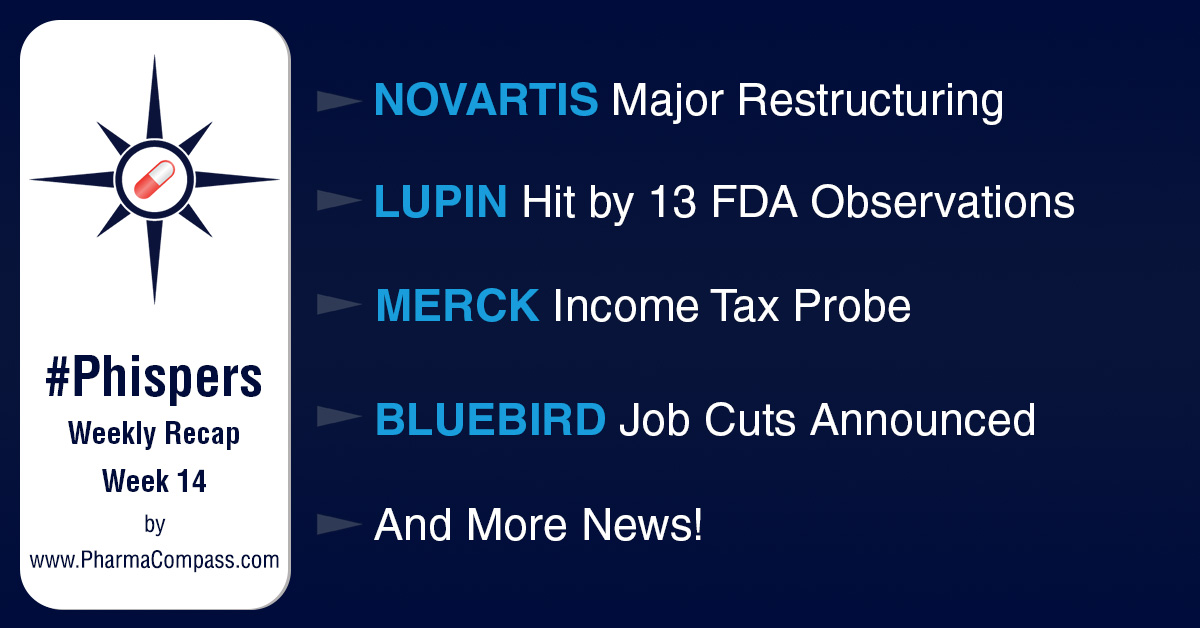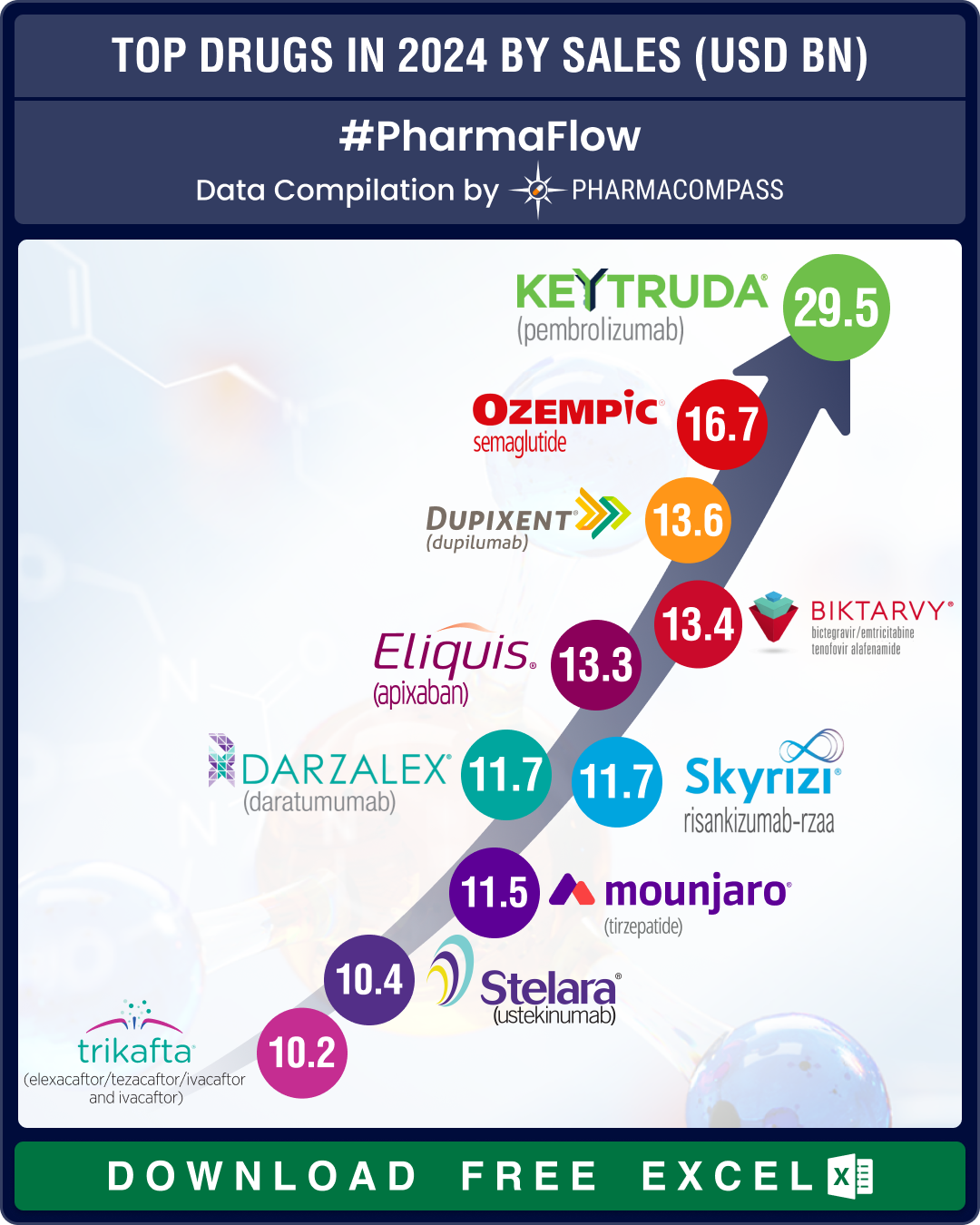
By PharmaCompass
2022-04-07
Impressions: 1,941
In this week’s Phispers, we bring you news about Swiss drugmaker Novartis’ organizational rejig whereby it has merged pharmaceuticals and oncology into an innovative medicines (IM) unit. The merger will help the drugmaker save at least US$ 1 billion in costs by 2024.
America’s Senate Finance Committee chairman Ron Wyden has written to Merck’s CEO and president Robert Davis, asking him to explain how the drugmaker managed to reduce its effective tax rate by half in 2021 and post just US$ 1.85 billion in pre-tax income.
While there has been much talk of the Great Resignation, this week we find three drugmakers working on reducing their workforces. While Novartis hopes to reduce staff through its restructuring, gene therapy developer Bluebird bio said it will reduce 30 percent of its staff in order to save US$ 160 million in costs over two years, and Sanofi is sacking 25 employees as it closes down the former headquarters of Kadmon, a company it acquired last year.
There was some interesting news on investments as well. Almost a year after Viatris shut operations of its solid oral dosage plant in Morgantown, West Virginia, the drugmaker said it has sold the facility to the West Virginia University for US$ 1. And Bayer said it will invest around US$ 2.23 billion (€2 billion) to upgrade its manufacturing sites over the next three years.
In regulatory news, Indian drugmaker Lupin said its facility in New Jersey has received 13 observations from the FDA. And Massachusetts-based biotech firm Curis said the FDA has placed a partial hold on a leukemia study after the death of a patient in the clinical trial.
In Covid news, the FDA has withdrawn the emergency use authorization (EUA) granted to GlaxoSmithKline and Vir Biotechnology’s monoclonal antibody, sotrovimab. The agency said the drug is no longer authorized to treat Covid-19 patients after the data suggested that sotrovimab is not effective against the dominant Omicron BA.2 sub-variant. And the WHO suspended the supply of Indian drugmaker Bharat Biotech’s Covid-19 vaccine – Covaxin – after an inspection spotted GMP violations.
Novartis merges pharma, oncology into new ‘innovative meds’ unit
Announcing a major organizational makeover, Swiss pharma Novartis said it is merging the pharmaceuticals and oncology units into an innovative medicines (IM) unit. The shake-up will help the drugmaker save at least US$ 1 billion in various costs by 2024.
The reorganization is being undertaken as Vas Narasimhan, Novartis’ CEO, seeks to convince shareholders that he can improve the drug behemoth’s performance. The rejig will trigger job cuts in the future, a Novartis spokesperson said.
This simplified structure, coupled with operational improvements, should also ensure a four percent sales growth in constant currency through 2026. In the mid-to-long term, the Swiss drugmaker hopes to deliver IM margin guidance of 30 to 40 percent.
The new unit will be divided into two divisions – the US market and international operations. The pharma giant is creating a new position of a chief strategy and growth officer who will head corporate strategy, R&D portfolio strategy and business development. Lutz Hegemann, president of global health, will lead the function in the interim. Marie-France Tschudin has been appointed president of the IM international unit and the chief commercial officer. Victor Bulto, the US head of pharmaceuticals, will be president of the IM unit in the US.
Bags approval to ship Zolgensma from its NC plant: A day after Novartis announced its restructuring, the drugmaker said it has received FDA’s approval to produce, test and ship its spinal muscular atrophy drug Zolgensma out of its North Carolina manufacturing facility. The 170,000-square-foot facility, located in the Research Triangle Park in Durham, North Carolina, is the second site to produce Zolgensma. The plant will also produce certain gene therapy products for use in clinical trials, Novartis said.
Senator probes Merck’s lower pre-tax income from US; seeks country-wise breakup of financials
Pharma companies often rely on their subsidiaries in low- or zero-tax countries to lower their tax bills. Merck is the latest company being probed over this, as the drugmaker’s effective tax rate has drawn the attention of the chairman of the Senate Finance Committee Ron Wyden.
In 2020, Merck reported an effective tax rate of 22.9 percent. A year later, the rate was less than half of that. On Monday, Wyden wrote to Merck’s CEO and president Robert Davis, asking the drugmaker to explain how it managed a tax rate of just 11 percent for 2021.
The US accounted for US$ 22.4 billion of Merck’s sales in 2021. However, it reported just US$ 1.85 billion in pre-tax income. In the international market, the drugmaker reported over US$ 12 billion in pre-tax income from about US$ 27 billion in international sales.
"This substantial discrepancy between Merck’s domestic and international pre-tax income appears to be the result of Merck’s use of subsidiaries in several well-known low- or zero-tax jurisdictions,” he wrote.
As part of his probe, Wyden has asked Merck for a country-by-country breakdown of its earnings, margins, headcount and taxes paid around the globe from 2019 to 2021.
Earlier this year, Wyden had written to Bristol Myers Squibb’s CEO Giovanni Caforio inquiring about a New York Times report that said BMS used offshore subsidiaries to avoid more than US$ 1 billion in taxes.
Bluebird bio to retrench 30 percent staffers to save US$ 160 million in costs
Novartis isn’t the only drugmaker to plan job cuts. Gene therapy developer Bluebird bio has said it plans to reduce its workforce by roughly 30 percent in order to save US$ 160 million in costs over the next two years. The company had 518 full-time employees as on January 31 this year.
In December last year, the FDA had paused trials of its gene therapy for sickle cell disease. In January, the agency had extended the review period for a decision on its beti-cel and eli-cel gene therapies. According to a Reuters news report, the cost savings are likely to help bring Bluebird through crucial upcoming milestones, such as the pending approval decisions on its two gene therapy candidates later this year.
Sanofi sacks 25 Kadmon employees: Last year, Sanofi had acquired Kadmon for US$ 1.9 billion. It is now retrenching 25 Kadmon staffers as it will be closing the former headquarters of Kadmon – 450 East 29th – in New York City. The layoffs will start in July and continue through April 1, 2023.
Indian drugmaker Lupin’s New Jersey facility hit by 13 FDA observations
Indian drugmaker Lupin said its facility in New Jersey has received 13 observations from the US Food and Drug Administration (FDA). The agency had carried out an inspection of the company’s wholly owned subsidiary, Novel Laboratories in Somerset, New Jersey, between March 7 and 30.
Lupin said it will work closely with the FDA to address these observations. The observations will not disrupt supplies or revenues from the operations of this facility, the drugmaker said. The facility contributes less than five percent of the company’s global revenues.
FDA pulls EUA for GSK-Vir’s Covid-19 drug as BA.2 cases continue to rise in US
Last week, the FDA had restricted the use of GlaxoSmithKline and Vir Biotechnology’s monoclonal antibody, sotrovimab, in certain regions of the US. This week, the FDA went a step further, pulling the emergency use authorization (EUA) of the antibody therapy. The agency said the drug is no longer authorized to treat Covid-19 patients, with data suggesting that sotrovimab is not effective against the dominant Omicron BA.2 sub-variant.
GSK and Vir, however, claimed that a higher dose of sotrovimab is effective against the BA.2 sub-variant. The two drugmakers said they are preparing data to support the use of a higher dose of sotrovimab for the BA.2 sub-variant. Vir said the drugmakers are also planning to submit an application for the full approval of the drug in the second half of the year.
Meanwhile, the US Senate has agreed on a US$ 10-billion emergency funding to fight the coronavirus pandemic. The funds are expected to come from untapped Covid-relief programs.
Bayer to invest US$ 2.2 billion over three years to upgrade manufacturing sites
Bayer will invest around US$ 2.23 billion (€2 billion) to upgrade several of its manufacturing sites over the next three years. The drugmaker plans to spend the money to strengthen the production of its cell and gene therapies as part of its strategy to focus on breakthrough biotech innovations that can deliver long-term growth.
Bayer plans to expand its production facility in Berkeley, California, where it is building a US$ 200 million cell therapy facility. It will also transform its supply centers in Berlin, Leverkusen and Bergkamen into centers of excellence, and make further investments in Wuppertal. The drugmaker will invest up to US$ 1.1 billion at these German sites.
The Germany-based pharma will transfer its manufacturing plant in Sao Paulo Cancioneiro, Brazil, and parts of the German sites in Bergkamen, Wuppertal and Berlin to new operators. It has already sold its production plant in Karachi, Pakistan.
West Virginia University buys shuttered Viatris plant for US$ 1
Back in 2020, Viatris, formerly known as Mylan, had announced the closure of its solid oral dosage plant in Morgantown, West Virginia, grabbing national attention. Last week, almost a year after it shut operations, the drugmaker said it has sold the facility to West Virginia University for US$ 1.
The university and the West Virginia University Health System, which does business as WVU Medicine, has signed a memorandum of understanding with Viatris to develop the 1.1 million-square-foot facility into academic, employment and community opportunities for Morgantown and surrounding areas. Discussions are underway with potential tenants to lease space at the facility. The university will also provide free scholarships to those who were impacted by its closure.
The solid oral dosage facility had been in operation since 1965 and used to employ around 1,400 employees.
FDA slaps partial hold on Curis’ leukemia study after patient’s death
Massachusetts-based biotech Curis said the FDA has placed a partial hold on a leukemia study after the death of a patient being treated in the clinical trial. Curis said the patient experienced rhabdomyolysis, a known risk of its experimental therapy, emavusertib.
Rhabdomyolysis is a condition where a muscle tissue breaks down, releasing muscle fibers and other substances into the blood and causing injury to the heart and kidneys. The FDA has asked for information about the patient’s death, along with safety and efficacy, Curis said.
The biotech cannot enroll any new patients in the study unless the partial hold is lifted. However, patients currently in the study who are benefiting from the therapy may continue to receive treatment. The biotech is running a separate phase 1/2 study evaluating emavusertib in patients with lymphomas.
Delays approval of Alnylam’s RNAi drug: The FDA has extended the review timeline of Cambridge-based biopharma Alnylam’s RNA interference (RNAi) therapy – vutrisiran –by three months.
The biopharma said the delay is not directly related to the drug, which is designed to treat transthyretin amyloidosis – a rare and fatal disease that causes a toxic buildup of protein in various tissues, including the heart and nervous system. In fact, the delay is due to a third-party secondary packaging and labeling facility, which was inspected by the agency. Alnylam had planned to use this packaging facility for the launch of vutrisiran. Alnylam has now chosen a new facility for packing and labeling vutrisiran and has amended its NDA. The FDA now plans to decide the fate of vutrisiran on July 14.
WHO suspends supply of Covaxin: The World Health Organization has suspended the supply of Indian drugmaker Bharat Biotech’s Covid-19 vaccine – Covaxin – through United Nations procurement agencies. The suspension comes after the global health agency found non-compliance of good manufacturing practices (GMP) at the drugmaker’s manufacturing facility in Hyderabad, India.
WHO had conducted a post-emergency use listing (EUL) inspection of the facility between March 14 and 22. The agency said the Hyderabad-based drugmaker has committed" itself to upgrading its manufacturing facilities and addressing the deficiencies.
The PharmaCompass Newsletter – Sign Up, Stay Ahead
Feedback, help us to improve. Click here
Image Credit : Phisper Infographic by SCORR MARKETING & PharmaCompass is licensed under CC BY 2.0
“ The article is based on the information available in public and which the author believes to be true. The author is not disseminating any information, which the author believes or knows, is confidential or in conflict with the privacy of any person. The views expressed or information supplied through this article is mere opinion and observation of the author. The author does not intend to defame, insult or, cause loss or damage to anyone, in any manner, through this article.”








